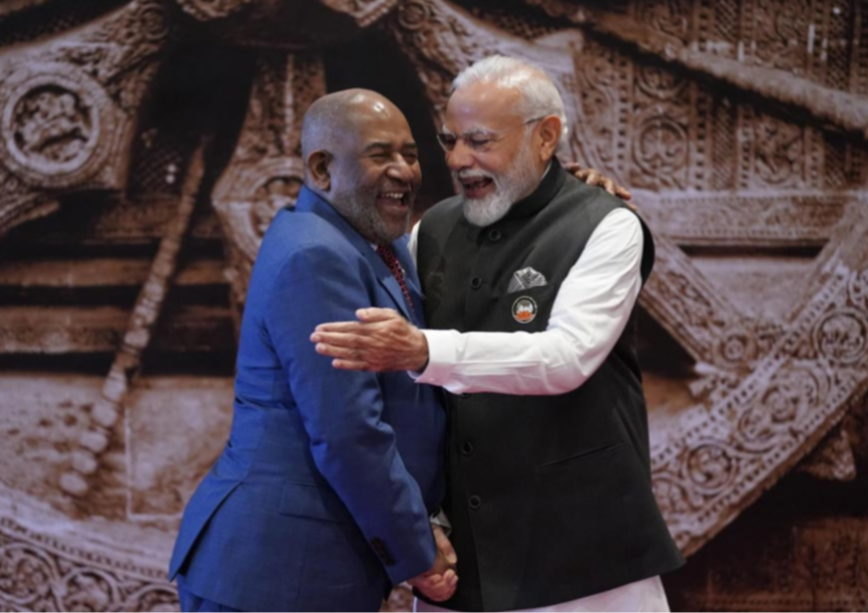-
CENTRES
Progammes & Centres
Location

The African Union’s (AU) ascension as a permanent member of the Group of Twenty (G20) marks a significant milestone in the realm of global economic governance. This historic development underscores the continent's burgeoning influence and acknowledges its potential as an emerging global powerhouse. The G20, encompassing approximately 85 percent of the world's gross domestic product (GDP) and over 75 percent of international trade, has historically been critiqued for its lack of inclusive representation, particularly from the Global South. The AU's membership ushers in a new era of inclusivity and is a stride towards rectifying the representational deficit, promising to amplify the collective voice of Africa's 55 nations within this critical economic forum.
Africa's integration into the G20 reflects an acknowledgement of its undeniable economic promise, with a combined GDP nearing US$ 3 trillion and a wealth of natural resources, including 60 percent of the world's renewable energy potential and a significant share of the minerals critical for low-carbon technologies. This positions the continent as an indispensable partner in the global economy and in the transition towards sustainable energy.
The continent's demographic trends present a significant opportunity, with a population anticipated to double by 2050, heralding a burgeoning young workforce in contrast to global ageing trends. Africa’s human capital offers the prospect of heightened productivity and economic growth, yet it also places a spotlight on the need for substantial job creation and the fostering of an environment conducive to harnessing this potential.
Figure 1: Population Age Distribution in Sub-Saharan Africa, 2050 estimate
Source: Charlson et al., United Nations Population Data
Africa boasts the world's youngest population, with 70 percent of sub-Saharan Africa aged under 30. This demographic dividend holds immense potential for the continent's progress, contingent upon fully empowering these young generations to realise their capabilities. Despite facing challenges such as underemployment and limited opportunities, African youth contribute significantly to their communities, advocating for justice and equality and even driving peace in conflict-affected areas.
Moreover, the AU's elevated status within the G20 serves as a pivotal platform to address critical challenges that impede the continent's development. Illicit financial flows, estimated at US$ 88.6 billion annually, represent a significant drain on Africa's resources, stifling economic development and hindering progress toward the Sustainable Development Goals (SDGs) and the AU’s own Agenda 2063. The ability to influence G20 policy could be instrumental in curbing these outflows and redirecting resources towards Africa's development.
The AU’s membership also strengthens Africa's position in shaping the global response to climate change—a phenomenon to which it is acutely vulnerable despite its minimal contribution to global emissions. Through the G20, the AU can now champion the continent's interests in climate resilience and sustainability, ensuring that global climate initiatives consider the unique challenges and contributions of African nations. Additionally, AU’s inclusion is also expected to increase its export revenue from G20 nations, which had comparatively slowed down in the last decade.
Figure 1: Value of G20 imports from Africa (in US$ Billion)
Source: Development Reimagined
The effective contribution of the AU within the G20 is contingent upon its ability to present a united front, harmonising the diverse interests of its member states to influence global decisions meaningfully. The African Union Commission and its Department of Economic Development, Trade, Tourism Industry, and Minerals will be pivotal in articulating and representing African interests across the G20's array of technical working groups.
The warm reception of the AU's G20 membership by African leaders signals a collective aspiration to leverage this new status for the advancement of the continent’s global standing.
This development is perceived as a platform to enhance Africa's visibility, voice, and influence on the international stage, thereby facilitating the pursuit of shared continental objectives and the acceleration of socioeconomic development.
As the AU gears up for South Africa's upcoming G20 presidency in 2025, the continent stands at the cusp of steering international discourse towards a more equitable global financial architecture. This new role within the G20 is anticipated to catalyse policy reforms that are more attuned to the development needs of the Global South, potentially heralding a transformative impact on the international economic order.
South Africa has a history of advocating for African interests at multilateral forums, and it has championed development issues specific to the continent within the G20.
The country's approach to its G20 presidency is expected to build on the achievements of preceding presidencies, such as India and Brazil, with a continued focus on the needs of emerging markets and developing countries. This includes addressing legacy issues like food and energy security, inequality, debt vulnerabilities, reforming multilateral development banks, and climate finance. A balance between financially sustainable development and climate change goals is also a priority, given the current lag in meeting the SDGs by 2030.
Finally, the AU's G20 membership is a clarion call for Africa to harness its newfound influence to advance both its development agenda and broader global interests. The continent's representation is set to reshape the dialogue on economic, climate, and fiscal policy, with the potential to bring resounding benefits to AU member states. This step forward in global economic participation signifies Africa's readiness to contribute actively to shaping a progressive, equitable, and sustainable future for all.
Soumya Bhowmick is an Associate Fellow at the Observer Research Foundation.
The views expressed above belong to the author(s). ORF research and analyses now available on Telegram! Click here to access our curated content — blogs, longforms and interviews.

Soumya Bhowmick is a Fellow and Lead, World Economies and Sustainability at the Centre for New Economic Diplomacy (CNED) at Observer Research Foundation (ORF). He ...
Read More +